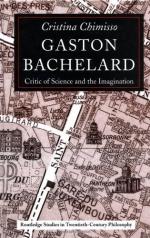|
This section contains 10,713 words (approx. 36 pages at 300 words per page) |

|
SOURCE: Kaplan, Edward K. “Gaston Bachelard's Philosophy of Imagination: An Introduction.” Philosophy and Phenomenological Research 33, no. 1 (September 1972): 1-24.
In the following essay, Kaplan surveys the major points of Bachelard's writings on imagination.
The academic career of Gaston Bachelard (1884-1962) was devoted to epistemology and the history and philosophy of science.1 A militant rationalist and materialist concerning science, Bachelard also indulged his rich imagination in a series of studies on imagination, from The Psychoanalysis of Fire (1938) to The Poetics of Reverie (1960).2 These essays examine the images of various writers whose works provide the subject matter for Bachelard's own theorizing on imagination. His working method was one of empathy with the text, identification with the supposed inner impulses of the writer. Bachelard's style is correspondingly subjective and personal, with theoretical formulations interspersed with his own play. He often uses technical terminology from literature, phenomenology, metaphysics, esthetics, etc., in a novel...
|
This section contains 10,713 words (approx. 36 pages at 300 words per page) |

|


